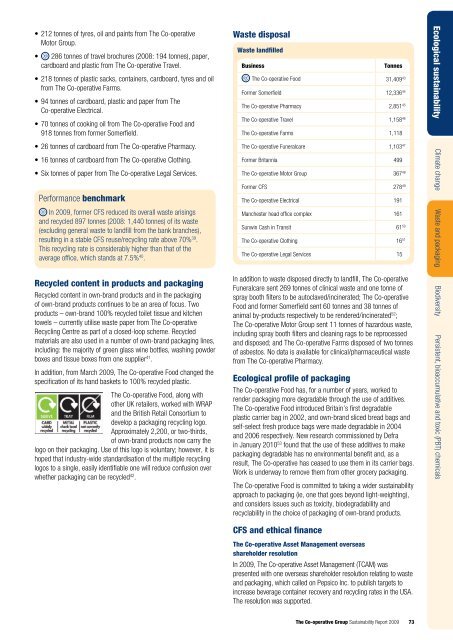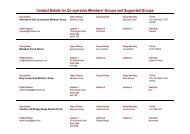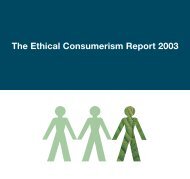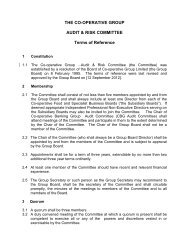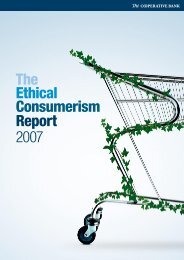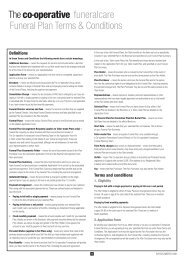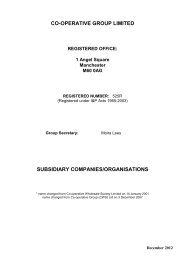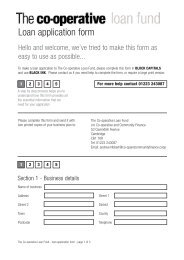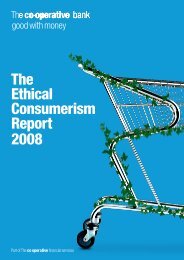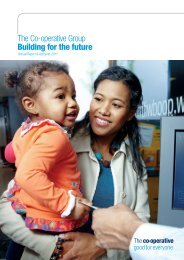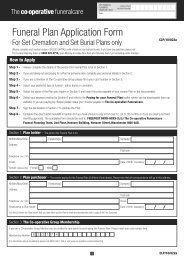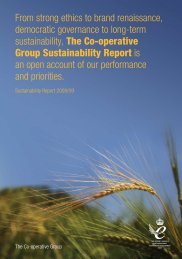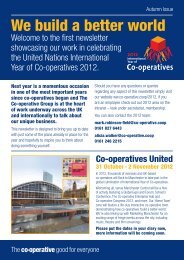Sustainability Report 2009 - The Co-operative
Sustainability Report 2009 - The Co-operative
Sustainability Report 2009 - The Co-operative
You also want an ePaper? Increase the reach of your titles
YUMPU automatically turns print PDFs into web optimized ePapers that Google loves.
• 212 tonnes of tyres, oil and paints from <strong>The</strong> <strong>Co</strong>-<strong>operative</strong><br />
Motor Group.<br />
• 286 tonnes of travel brochures (2008: 194 tonnes), paper,<br />
cardboard and plastic from <strong>The</strong> <strong>Co</strong>-<strong>operative</strong> Travel.<br />
• 218 tonnes of plastic sacks, containers, cardboard, tyres and oil<br />
from <strong>The</strong> <strong>Co</strong>-<strong>operative</strong> Farms.<br />
• 94 tonnes of cardboard, plastic and paper from <strong>The</strong><br />
<strong>Co</strong>-<strong>operative</strong> Electrical.<br />
• 70 tonnes of cooking oil from <strong>The</strong> <strong>Co</strong>-<strong>operative</strong> Food and<br />
918 tonnes from former Somerfield.<br />
• 26 tonnes of cardboard from <strong>The</strong> <strong>Co</strong>-<strong>operative</strong> Pharmacy.<br />
• 16 tonnes of cardboard from <strong>The</strong> <strong>Co</strong>-<strong>operative</strong> Clothing.<br />
• Six tonnes of paper from <strong>The</strong> <strong>Co</strong>-<strong>operative</strong> Legal Services.<br />
Performance benchmark<br />
In <strong>2009</strong>, former CFS reduced its overall waste arisings<br />
and recycled 897 tonnes (2008: 1,440 tonnes) of its waste<br />
(excluding general waste to landfill from the bank branches),<br />
resulting in a stable CFS reuse/recycling rate above 70% 39 .<br />
This recycling rate is considerably higher than that of the<br />
average office, which stands at 7.5% 40 .<br />
Recycled content in products and packaging<br />
Recycled content in own-brand products and in the packaging<br />
of own-brand products continues to be an area of focus. Two<br />
products – own-brand 100% recycled toilet tissue and kitchen<br />
towels – currently utilise waste paper from <strong>The</strong> <strong>Co</strong>-<strong>operative</strong><br />
Recycling Centre as part of a closed-loop scheme. Recycled<br />
materials are also used in a number of own-brand packaging lines,<br />
including: the majority of green glass wine bottles, washing powder<br />
boxes and tissue boxes from one supplier 41 .<br />
In addition, from March <strong>2009</strong>, <strong>The</strong> <strong>Co</strong>-<strong>operative</strong> Food changed the<br />
specification of its hand baskets to 100% recycled plastic.<br />
<strong>The</strong> <strong>Co</strong>-<strong>operative</strong> Food, along with<br />
other UK retailers, worked with WRAP<br />
and the British Retail <strong>Co</strong>nsortium to<br />
develop a packaging recycling logo.<br />
Approximately 2,200, or two-thirds,<br />
of own-brand products now carry the<br />
logo on their packaging. Use of this logo is voluntary; however, it is<br />
hoped that industry-wide standardisation of the multiple recycling<br />
logos to a single, easily identifiable one will reduce confusion over<br />
whether packaging can be recycled 42 .<br />
Waste disposal<br />
Waste landfilled<br />
Business<br />
Tonnes<br />
<strong>The</strong> <strong>Co</strong>-<strong>operative</strong> Food 31,409 43<br />
Former Somerfield 12,336 44<br />
<strong>The</strong> <strong>Co</strong>-<strong>operative</strong> Pharmacy 2,851 45<br />
<strong>The</strong> <strong>Co</strong>-<strong>operative</strong> Travel 1,158 46<br />
<strong>The</strong> <strong>Co</strong>-<strong>operative</strong> Farms 1,118<br />
<strong>The</strong> <strong>Co</strong>-<strong>operative</strong> Funeralcare 1,103 47<br />
Former Britannia 499<br />
<strong>The</strong> <strong>Co</strong>-<strong>operative</strong> Motor Group 367 48<br />
Former CFS 278 49<br />
<strong>The</strong> <strong>Co</strong>-<strong>operative</strong> Electrical 191<br />
Manchester head office complex 161<br />
Sunwin Cash in Transit 61 50<br />
<strong>The</strong> <strong>Co</strong>-<strong>operative</strong> Clothing 16 51<br />
<strong>The</strong> <strong>Co</strong>-<strong>operative</strong> Legal Services 15<br />
In addition to waste disposed directly to landfill, <strong>The</strong> <strong>Co</strong>-<strong>operative</strong><br />
Funeralcare sent 269 tonnes of clinical waste and one tonne of<br />
spray booth filters to be autoclaved/incinerated; <strong>The</strong> <strong>Co</strong>-<strong>operative</strong><br />
Food and former Somerfield sent 60 tonnes and 38 tonnes of<br />
animal by-products respectively to be rendered/incinerated 52 ;<br />
<strong>The</strong> <strong>Co</strong>-<strong>operative</strong> Motor Group sent 11 tonnes of hazardous waste,<br />
including spray booth filters and cleaning rags to be reprocessed<br />
and disposed; and <strong>The</strong> <strong>Co</strong>-<strong>operative</strong> Farms disposed of two tonnes<br />
of asbestos. No data is available for clinical/pharmaceutical waste<br />
from <strong>The</strong> <strong>Co</strong>-<strong>operative</strong> Pharmacy.<br />
Ecological profile of packaging<br />
<strong>The</strong> <strong>Co</strong>-<strong>operative</strong> Food has, for a number of years, worked to<br />
render packaging more degradable through the use of additives.<br />
<strong>The</strong> <strong>Co</strong>-<strong>operative</strong> Food introduced Britain’s first degradable<br />
plastic carrier bag in 2002, and own-brand sliced bread bags and<br />
self-select fresh produce bags were made degradable in 2004<br />
and 2006 respectively. New research commissioned by Defra<br />
in January 2010 53 found that the use of these additives to make<br />
packaging degradable has no environmental benefit and, as a<br />
result, <strong>The</strong> <strong>Co</strong>-<strong>operative</strong> has ceased to use them in its carrier bags.<br />
Work is underway to remove them from other grocery packaging.<br />
<strong>The</strong> <strong>Co</strong>-<strong>operative</strong> Food is committed to taking a wider sustainability<br />
approach to packaging (ie, one that goes beyond light-weighting),<br />
and considers issues such as toxicity, biodegradability and<br />
recyclability in the choice of packaging of own-brand products.<br />
Ecological sustainability Climate change Waste and packaging Biodiversity Persistent, bioaccumulative and toxic (PBT) chemicals<br />
CFS and ethical finance<br />
<strong>The</strong> <strong>Co</strong>-<strong>operative</strong> Asset Management overseas<br />
shareholder resolution<br />
In <strong>2009</strong>, <strong>The</strong> <strong>Co</strong>-<strong>operative</strong> Asset Management (TCAM) was<br />
presented with one overseas shareholder resolution relating to waste<br />
and packaging, which called on Pepsico Inc. to publish targets to<br />
increase beverage container recovery and recycling rates in the USA.<br />
<strong>The</strong> resolution was supported.<br />
<strong>The</strong> <strong>Co</strong>-<strong>operative</strong> Group <strong>Sustainability</strong> <strong>Report</strong> <strong>2009</strong> 73


